Serving 1,393 students in grades Prekindergarten-12, Marion P. Thomas Charter School ranks in the bottom 50% of all schools in New Jersey for overall test scores (math proficiency is bottom 50%, and reading proficiency is bottom 50%).
The percentage of students achieving proficiency in math is 7% (which is lower than the New Jersey state average of 36%). The percentage of students achieving proficiency in reading/language arts is 24% (which is lower than the New Jersey state average of 49%).
The student:teacher ratio of 21:1 is higher than the New Jersey state level of 11:1.
Quick Stats (2025)
- School Type: Charter School
- Grades: Prekindergarten-12
- Enrollment: 1,393 students
- Student:Teacher Ratio: 21:1
- Graduation Rate: 90-94% (Top 30% in NJ)
- Overall Testing Rank: Bottom 50%
- Math Proficiency: 7% (Btm 50%)
- Reading Proficiency: 24% (Btm 50%)
- Science Proficiency: ≤1% (Btm 50%)
- Source: National Center for Education Statistics (NCES), NJ Dept. of Education
School Overview
Marion P. Thomas Charter School's student population of 1,393 students has declined by 13% over five school years.
The teacher population of 65 teachers has declined by 30% over five school years.
School Type
Grades Offered
Grades Prekindergarten-12
Total Students
1,393 students
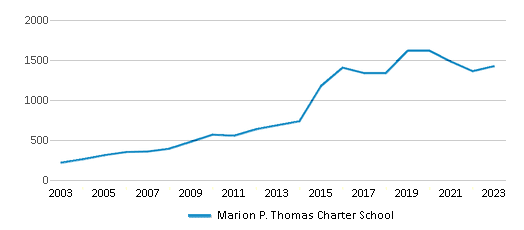
Gender %
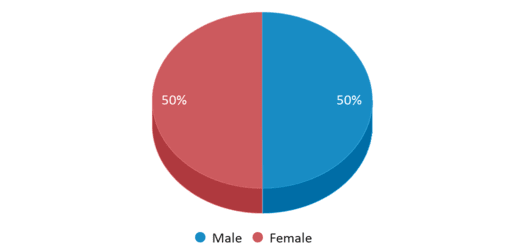
Total Classroom Teachers
65 teachers
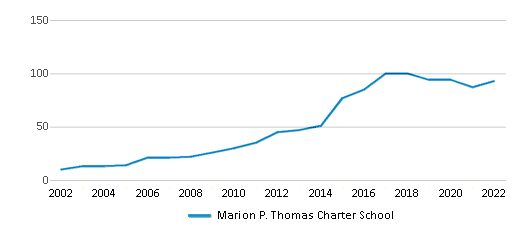
Students by Grade
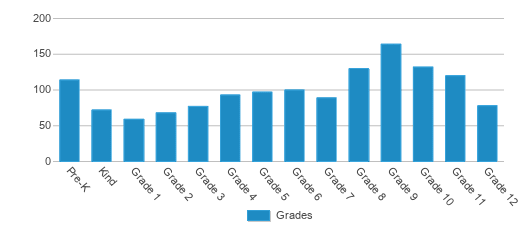
School Rankings
Marion P. Thomas Charter School ranks within the bottom 50% of all 2,201 schools in New Jersey (based off of combined math and reading proficiency testing data).
The diversity score of Marion P. Thomas Charter School is 0.32, which is less than the diversity score at state average of 0.72. The school's diversity has stayed relatively flat over five school years.
Overall Testing Rank
#2027 out of 2201 schools
(Bottom 50%)
(Bottom 50%)
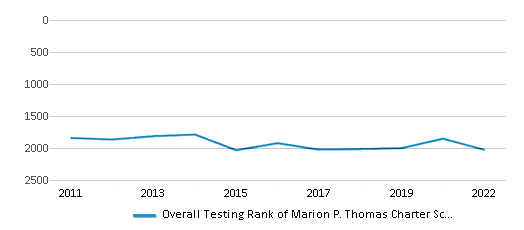
Math Test Scores (% Proficient)
7%
36%
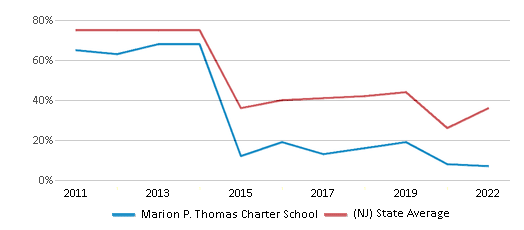
Reading/Language Arts Test Scores (% Proficient)
24%
49%
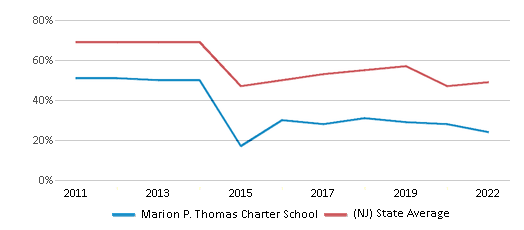
Science Test Scores (% Proficient)
≤1%
23%
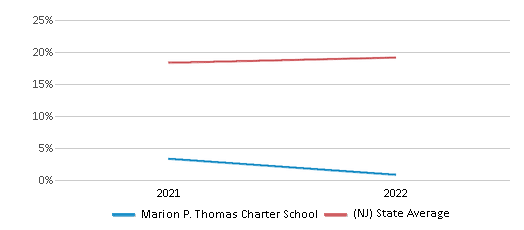
Student : Teacher Ratio
21:1
11:1
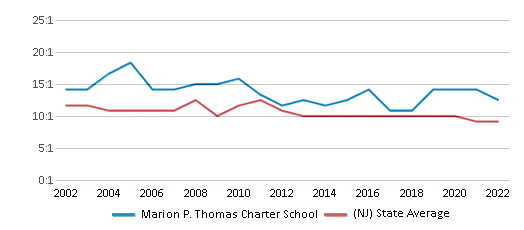
American Indian
1%
n/a
Asian
n/a
10%
Hispanic
17%
34%
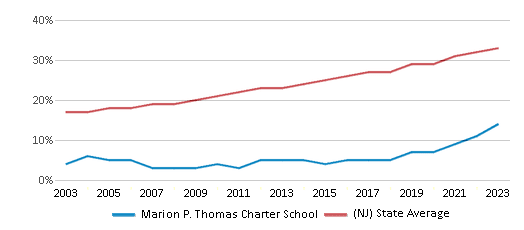
Black
81%
15%
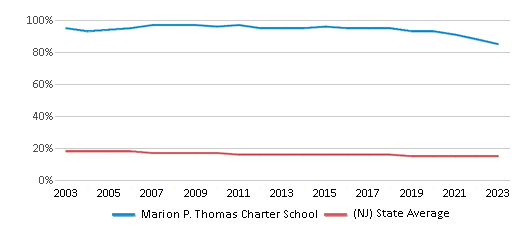
White
n/a
38%
Hawaiian
n/a
n/a
Two or more races
1%
3%
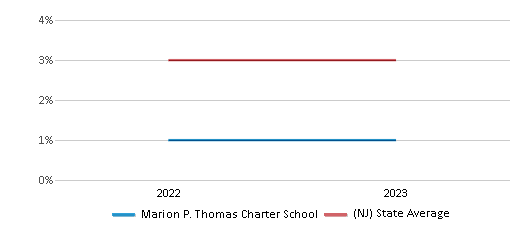
All Ethnic Groups
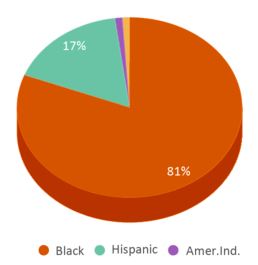
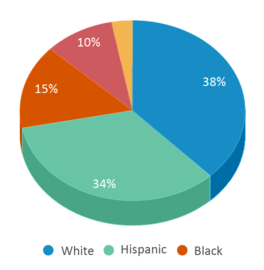
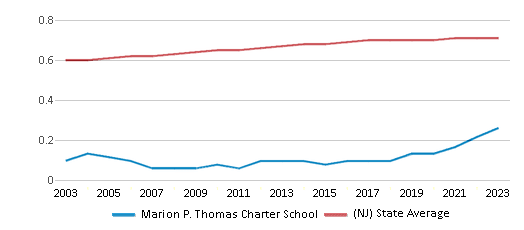
Graduation Rate
90-94%
85%
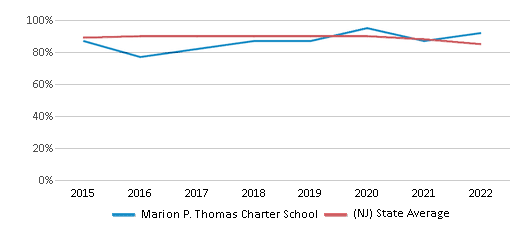
Participates in the National School Lunch Program (NSLP)
Yes
Eligible for Free Lunch
30%
32%
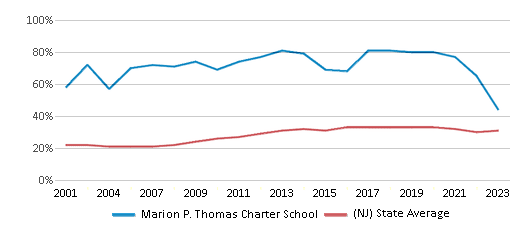
Eligible for Reduced Lunch
2%
6%
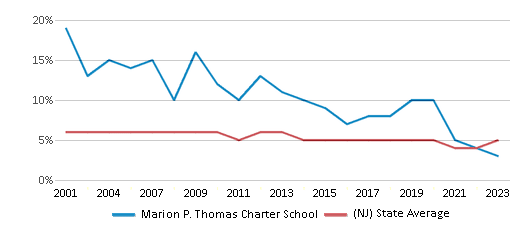
School Statewide Testing
School District Name
Source: National Center for Education Statistics (NCES), NJ Dept. of Education
Profile last updated: 02/09/2025
Frequently Asked Questions
What is Marion P. Thomas Charter School's ranking?
Marion P. Thomas Charter School is ranked #2027 out of 2,201 schools, which ranks it among the bottom 50% of public schools in New Jersey.
What schools are Marion P. Thomas Charter School often compared to?
Marion P. Thomas Charter Schoolis often viewed alongside schools like North Star Academy Charter School by visitors of our site.
What percent of students have achieved state testing proficiency in math and reading?
7% of students have achieved math proficiency (compared to the 36% NJ state average), while 24% of students have achieved reading proficiency (compared to the 49% NJ state average).
What is the graduation rate of Marion P. Thomas Charter School?
The graduation rate of Marion P. Thomas Charter School is 90-94%, which is higher than the New Jersey state average of 85%.
How many students attend Marion P. Thomas Charter School?
1,393 students attend Marion P. Thomas Charter School.
What is the racial composition of the student body?
81% of Marion P. Thomas Charter School students are Black, 17% of students are Hispanic, 1% of students are American Indian, and 1% of students are Two or more races.
What is the student:teacher ratio of Marion P. Thomas Charter School?
Marion P. Thomas Charter School has a student ration of 21:1, which is higher than the New Jersey state average of 11:1.
What grades does Marion P. Thomas Charter School offer ?
Marion P. Thomas Charter School offers enrollment in grades Prekindergarten-12
What school district is Marion P. Thomas Charter School part of?
Marion P. Thomas Charter School is part of Marion P. Thomas Charter School District.
In what neighborhood is Marion P. Thomas Charter School located?
Marion P. Thomas Charter School is located in the University Heights neighborhood of Newark, NJ. There are 3 other public schools located in University Heights.
School Reviews
5 7/27/2012
The school has abundant resources for the students and the staff are engaged in making sure the students are challenged. I have two children who attended MPTCS and they continue to be excellent students in HS.
5 4/2/2008
The Reader's and Writer's Workshop along with hundreds of manipulatives for math and fuzzy math in the program makes this school and school of excellence!!!!! Go Tigers!
2 11/8/2007
The academic programs at this school are not good and better teaching is found at newark public schools. The extracurricular activities do not challenge the students and neither does the classes. The teachers are nice to students and seem well educated. Parent involvment is very low. The parents don't seem to really be involved in the students work. The school has a somewhat clean environment.
5 5/1/2007
marion p thmas is awonderful school for children. i would recoommend any and every parent to go to the school. the teachers would give your child the best education they would need in life. they also would help your chid get in to one of the good schools in newark so let your come i know i been here sense k and they are good to you.
Review Marion P. Thomas Charter School. Reviews should be a few sentences in length. Please include any comments on:
- Quality of academic programs, teachers, and facilities
- Availability of music, art, sports and other extracurricular activities
Recent Articles

What Is A Charter School?
Explore the world of charter schools in this comprehensive guide. Learn about their history, how they operate, and the pros and cons of this educational innovation. Discover key facts about charter schools, including admission policies, demographics, and funding, as well as what to look for when considering a charter school for your child.

10 Reasons Why High School Sports Benefit Students
Discover the 10 compelling reasons why high school sports are beneficial for students. This comprehensive article explores how athletics enhance academic performance, foster personal growth, and develop crucial life skills. From improved fitness and time management to leadership development and community representation, learn why participating in high school sports can be a game-changer for students' overall success and well-being.

February 05, 2025
Understanding the U.S. Department of Education: Structure, Impact, and EvolutionWe explore how the Department of Education shapes American education, from its cabinet-level leadership to its impact on millions of students, written for general audiences seeking clarity on this vital institution.









